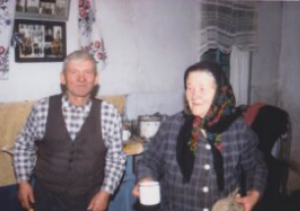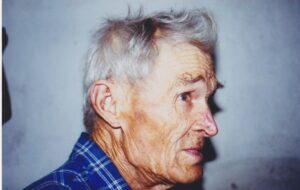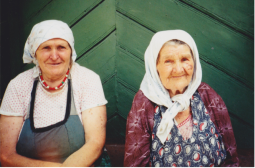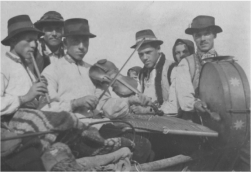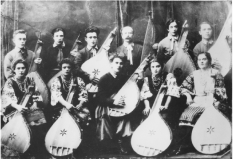Halyna Ilarionivna Riasna (Cherkasy region)
—How many hectares of land did you have before collectivization?
Halyna Ilarionivna: About ten.
—When someone was getting married, did they get any land?
Halyna Ilarionivna: No, because this was already during the time of the kolhosp.
—How many head of cattle did you have?
Halyna Ilarionivna: Two oxen, a cow, a horse, pigs, and hens. We also had plows.
—Besides farming, did your father have a trade?
Halyna Ilarionivna: No.
—Do you remember where the market fairs were held?
Halyna Ilarionivna: In Vedmedivka.
—Did people go there to buy or sell the goods?
Halyna Ilarionivna: They went to buy things. They’d sell the bulls in one place and go to the other market to buy bulls again.
…………………………………………………………………….
—What did land mean for your parents?
Halyna Ilarionivna: They worked the land and were happy to have it. My father would sell a calf and buy some more land from the khaziaii.
Halyna Ilarionivna Riasna (Cherkasy region)
—Prior to collectivization, were there zbory (assemblies) in the village?
Halyna Ilarionivna: Not zbory, but a skhodka. My parents used to go.
—Your parents paid taxes. What was the tax?
Halyna Ilarionivna: They took [grain] to Tsentrzerno [The Central Grain Warehouse] in Kamianka.
—Where in the village did the skhodka take place?
Halyna Ilarionivna: In the village council.
—And prior to collectivization?
Halyna Ilarionivna: The village council already existed at the time. I was six years old when they were setting it up.
—Did women go there?
Halyna Ilarionivna: Why would they? At the time, women didn’t go anywhere. They had no time to go. They were busy spinning yarn and weaving.
—Were the khaziaii the only ones who went?
Halyna Ilarionivna: If a skhodka was necessary, men would be summond and they would go.
Halyna Ilarionivna Riasna (Cherkasy region)
—When you lived at your parents’, did your whole family live in one house?
Halyna Ilarionivna: All of us lived in one house. Then my middle sister got married. Then my brother also got married while my sister and I stayed at home until I got married. I settled here and have been living here since.
—What kind of work did your mother do and what did your father do?
Halyna Ilarionivna: They were both taking care of the homestead. We had land, oxen, a horse, and a cow. My father would harness the oxen and go plow the field; my mother cooked and brought food to the field. They would also sow and weed the crops. The cattle were the responsibility of my father. When the kolhospy were built, all our property was taken to the kolhosp.
—Was your father in charge of family life, or would your mother be in charge at times?
Halyna Ilarionivna: My father was the head of the homestead.
—Who helped around?
Halyna Ilarionivna: The children. My brother plowed using the horse, and my father—using the oxen.
—Who was in charge of the family’s money?
Halyna Ilarionivna: My father.
…………………………………………………………………….
—Would your father hire only men for a specific type of work, and only women for another type of work?
Halyna Ilarionivna: Women were hired to plow and sow. Then we grew up and my father would transport the haystacks together with the girls. They managed it on their own. Girls did men’s work.
Halyna Ilarionivna Riasna (Cherkasy region)
—What was the name of the kutok (corner of the village) where your family lived?
Halyna Ilarionivna: Who knows? This kutok was called the center; over there—Maiorshchyna; where we were—Rizanovo; and there—Spasovo and Riabtsevo. I don’t know what the kutok of the first brigade was called. When the kolhospy began, they started calling the kutki the first brigade, the second brigade; we were the fourth brigade.
…………………………………………..…..……………..…
—When the kolhospy were set up, did the people continue to celebrate Christmas and have parties like before?
Halyna Ilarionivna: Not anymore.
…………………………………………..…..……………..…
—Did many people move to the city to work when the kolhospy started?
Halyna Ilarionivna: Almost all young people from Lubentsi went to Cherkasy or Smila.
—They didn’t want to work in the kolhosp?
Halyna Ilarionivna: They didn’t pay the money back then, and the young people wanted to buy shoes. They went to work in a sugar plant and some other plants. There was a mechanics plant in Smila, I forgot its name.
Halyna Ilarionivna Riasna (Cherkasy region)
—How much were you paid by the kolhosp?
Halyna Ilarionivna: They paid us with flour, and they also marked the days worked. There was no money until 1941. In 1941, the war began, so we didn’t see any money either. They started paying us money in 1955 or 1965.
……………………………………………………………………………………….
—Did you care whether there would be a good crop in the kolhosp?
Halyna Ilarionivna: Yes, of course! We survived the famine, so we cared about the crops.
……………………………………………………………………………………….
—Is it fair to say that the longer you worked in the kolhosp the more you were paid?
Halyna Ilarionivna: Yes, we worked to earn more workday marks. I used to log seven hundred workdays per year, and we had more grain. We used to grow flax and linen at home and weave cloth. We used to soak the hemp in the rivers, break it, remove the husks, and weave in winter when we didn’t have to go to work in the kolhosp. We would prepare the slivers, spin yarn on a swift, warp it, and weave.
—How much land did you have?
Halyna Ilarionivna: We had 0.5 hectares each.
—Did you call the kolhosp land your land?
Halyna Ilarionivna: The plots were ours, so we called the land ours.
……………………………………………………………………………………….
—Where did you get the money for daily expenses?
Halyna Ilarionivna: We sold hens and Easter eggs. I would make starch from potatoes, sell it on the market, and buy millet. This scarf cost me 230 rubles. I bought it and went back home.
—Did you make clothes by yourself or did you buy it?
Halyna Ilarionivna: We used to break the flax, spin yarn, weave, and sew the skirts and shirts. We’d buy the dyes and dye the fabrics.
—Did you make clothes for an exchange?
Halyna Ilarionivna: We would weave the cloth, sell it, and buy something else that we needed.
—Did you exchange produce for clothes?
Halyna Ilarionivna: No, we only sold the produce.
Halyna Ilarionivna Riasna (Cherkasy region)
—Did people steal in the kolhosp?
Halyna Ilarionivna: There was no theft at the time, God forbid! You were not allowed to do so, and people were put on trial. Now, people take whatever they wish.
—What if someone stole something back in the day?
Halyna Ilarionivna: They’d be on trial.
Halyna Ilarionivna Riasna (Cherkasy region)
—Was it mandatory to go to the zbory/elections?
Halyna Ilarionivna: There were no elections at the time. They would call a meeting and elect the heads of the kolhosp, the village council, and the administration. They elected them on their own.
—When were the members of parliament elected?
Halyna Ilarionivna: There were no members of parliament before the war.
………………………………………………………………………………………..
—Was a meeting called when the kolhosp was being set up?
Halyna Ilarionivna: Yes, every day. They would tell everyone at work to come to the meeting.
—Where were the meetings held?
Halyna Ilarionivna: In the club.
—Were there any women there?
Halyna Ilarionivna: Sure thing, there were women, and we the girls used to go, too. But we didn’t listen to them, we were focused on what we liked.
—Did you vote?
Halyna Ilarionivna: No, we didn’t.
—Did men and women have equal rights?
Halyna Ilarionivna: Men and women had one right. If they wanted to shout, they could.
Halyna Ilarionivna Riasna (Cherkasy region)
—Were children in schools told to stop caroling?
Halyna Ilarionivna: They used to say: “Don’t listen to anything because it’s not true and don’t believe in God.”
—Did the wedding songs include songs about Christ?
Halyna Ilarionivna: When our parents had parties, they’d sing “Christ Has Risen,” but not anymore.
—Then the authorities said…
Halyna Ilarionivna: They said not to practice religion. But I have been saying as long as I can remember that we don’t see God, but he exists; there is someone there who governs us. Old people used to say: “The time will come that God will refuse to be our master, and the Devil will rule. When the Devil rules, there will be no churches, nothing.” People used to say so back in the day, and so it became.
Natalia Hryhorivna Semeniaka (Cherkasy region)
—Was the priest expelled during the kolhosp time?
Natalia Hryhorivna: No, he stayed.
—When was the church destroyed?
Natalia Hryhorivna: I don’t remember what year it was. A man from the villages went up and dismantled the bells; he was paid to do so. I don’t know there the bells were taken. It used to be when someone died, they’d ring the bells, just as they would for a holiday, and on Easter the bells would be heard from dawn until dusk, and the day after as well. People would come to the church; there was joy and celebrations. It was nice. Then when the kolhosp came, people stopped going to church, and the church was gone, destroyed.
……………………………………
Natalia Hryhorivna: People no longer had church weddings; I was the last one who did.
Halyna Ilarionivna Riasna (Cherkasy region)
—Was there a church in your village?
Halyna Ilarionivna: Yes.
—When was it destroyed?
Halyna Ilarionivna: In 1943, after the teacher hanged himself.
—Did the older people sing psalms at the funerals?
Halyna Ilarionivna: Not in our village back in the day, but they started singing just recently. They hadn’t even read the Book of Psalms. When someone died, they would just do a simple burial.
—Did the priest sing before the war?
Halyna Ilarionivna: When we had a church, the priest would be there at the funeral. After the church was burned, there was no longer a priest in the village, so the burial was without a priest.
—What happened to the priest?
Halyna Ilarionivna: He left somewhere to do his own things. There was no place to minister. I don’t know where he went.
—Who sings now?
Halyna Ilarionivna: Well, if I came to a funeral, that would be you, and me, and another woman. One reads, the other says, “Let’s sing.”
—Do you know a few psalms?
Halyna Ilarionivna: I have forgotten many.
Halyna Ilarionivna Riasna (Cherkasy region)
—When koliadky were forbidden in public, did the people continue singing them at home with their children?
Halyna Ilarionivna: Not in our house.
…………………………………………………………
—Were the children in schools told to stop singing shchedrivky?
Halyna Ilarionivna: They would say, “Don’t listen to any of that because it’s not true; do not believe in God.”
Oleksii Ivanovych Syniuk (Poltava region)
—Did the people in your village go singing koliadky?
Oleksii Ivanovych: You know, it’s been gradually disappearing, but I remember when I was a young boy, it was like a profession: “Shchedryk-vedryk, give me a varenyk and a roll of kovbasa. / If that’s not enough, give me some lard. / If I can carry more, give me kovbasa. / If you don’t, I’ll destroy the house.”
—What about during collectivization?
Oleksii Ivanovych: Nothing like this was organized, and the adults didn’t go either.
—Was it forbidden?
Oleksii Ivanovych: Religion was forbidden. These conversations would happen: “Are you a Komsomolets?” “Yes, I am.”—“Are there any icons in your house?”—“Yes.”—“You must remove them.”
Halyna Ilarionivna Riasna (Cherkasy region)
—Did you have dosvitky or vechornytsi?
Halyna Ilarionivna: Yes, people used to go to those.
—What word did people use in your village: dosvitky or vechornytsi?
Halyna Ilarionivna: Dosvitky.
—Who organized them?
Halyna Ilarionivna: We would get together, and someone would say, “Let’s get together to spin yarn or embroider things.” I used to emroider all the time, and we would go home to sleep because it was close by. We used to gather in the neighborhood [kutok].
—Did every neighborhood [kutok] have its own dosvitky?
Halyna Ilarionivna: Yes, yes. The parents would go somewhere, and we would gather to spin yarn or embroider things. The guys would come to join us.
—Where did you use to gather?
Halyna Ilarionivna: In houses.
—Whose houses?
Halyna Ilarionivna: They could come to my house, for instance, if I didn’t have a mother.
—Did people rent a house from a widow or someone else?
Halyna Ilarionivna: We didn’t rent a house.
…………………………………………………………………………………
—What happened to dosvitky later?
Halyna Ilarionivna: There were no dosvitky after the war.
—And during the war?
Halyna Ilarionivna: There were none because people were afraid to leave their house at the time.
—Why did they stop?
Halyna Ilarionivna: I don’t know. This was when I got married.
—Were the authorities against dosvitky?
Halyna Ilarionivna: No.
Halyna Ilarionivna Riasna (Cherkasy region)
—Do you remember when the club was organized in the kolhosp?
Halyna Ilarionivna: It was when they dispossessed people and took their houses (a rich man lived in the house that became the club; his house was nice). The kolhosp took the barn, and it’s still standing.
—Did they rebuild it?
Halyna Ilarionivna: It was a log house on a foundation. I don’t know if they took it apart and moved it. They took the house and made a club. Then they took it apart and made a new club on the same spot.
—Was the house owner evicted?
Halyna Ilarionivna: Yes.
—He didn’t come back?
Halyna Ilarionivna: He did, but he’s no longer alive.
—What was his last name?
Halyna Ilarionivna: Ivan Kryvenko.
—Was he evicted with his family?
Halyna Ilarionivna: Yes, with his family. He came back and built a house.
…………………………………………………………………………………
—When the clubs began, who played [instrumental music] in them?
Halyna Ilarionivna: The same village guys and the ones from the nearby villages of Zamiatyn and Chubivka. They played harmonia and bubon. The weddings took place in the club.
…………………………………………………………………………………
—Do you remember the director of the club?
Halyna Ilarionivna: There was one, sure thing.
—What did he do?
Halyna Ilarionivna: He organized theater performances; we sang in the choir. I’ve forgotten some. Vira was in charge of everything here. She’d say, “Let’s go, girls, let’s organize the evening singing.” We sang on stage.
…………………………………………………………………………………
—Were there any bandura players in your village?
Halyna Ilarionivna: No. During collectivization, some came from Chyhyryn. They would occasionally come to our house for a sleepover. They would leave their baskets in the house, and one time we got fleas from them. My mother had to treat the benches with steam.
—How many of them were there?
Halyna Ilarionivna: About fifteen.
—Did you go to their concert?
Halyna Ilarionivna: Yes, of course.
—What did they sing?
Halyna Ilarionivna: I don’t remember.
Halyna Ilarionivna Riasna (Cherkasy region)
—What neighborhood (kutok) in your village had the best singers?
Halyna Ilarionivna: Rizanovo.
—Was it because they had a good lead singer?
Halyna Ilarionivna: Well, yes. They would come to the club and say, “Let’s sing, girls.” We’d stand in a circle and sing.
—Was there any competition between the neighborhoods?
Halyna Ilarionivna: Of course.
—Was this in the evenings?
Halyna Ilarionivna: Sure thing. By day, we had no time. Back then, we worked even on Sundays. When it was time to harvest the crops, the brigade leader would tell everyone to come to work on Sunday. My mother would not let me go, but my sister would say, “Let’s go. There’s no one else there who can reap the crops.” I would be crying on the way because I wanted to rest a little.
…………………………………………………………………………………
—Did you have Women’s Day?
Halyna Ilarionivna: That was May 9, for St. Nicholas Day [sic]. People would go collecting some medicinal weeds. Then they would go swimming in the water for Kupala Night.
—Why did they do this?
Halyna Ilarionivna: They made it up back in the day; that’s all.
…………………………………………………………………………………
—Who taught you to sing?
Halyna Ilarionivna: I learned on the streets, but I have forgotten everything. We gathered on the streets and sang more before the kolhospy began.
—Did you go to a nearby village?
Halyna Ilarionivna: No, I didn’t go, but maybe others did.
—Did people in the neighboring village sing the same as people in your village did or were there differences?
Halyna Ilarionivna: They sang the same way as we did. When they broadcast songs on the radio now, the villages in Poltava have totally different songs.
—Were there spring songs in your village?
Halyna Ilarionivna: No.
—What about Kupala Night?
Halyna Ilarionivna: There was no Kupala Night in our village. Perhaps we didn’t have enough young people for that celebration; all of them were in Cherkasy.
